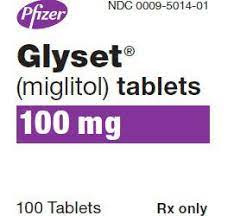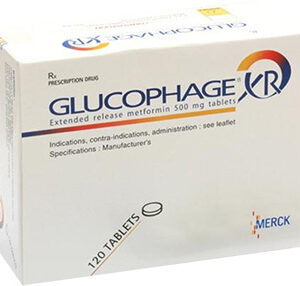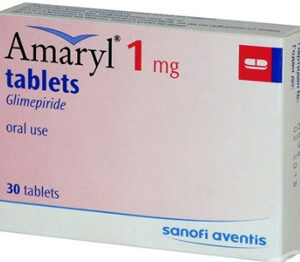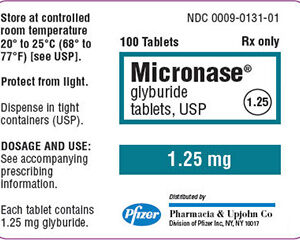Glyset, also known by its generic name miglitol, is an oral medication used to control high blood sugar levels in people with type 2 diabetes. It belongs to a class of drugs called alpha-glucosidase inhibitors, which work by slowing down the absorption of carbohydrates in the intestine. By delaying the digestion and breakdown of carbohydrates into glucose, Glyset helps to prevent the rapid rise in blood sugar levels after meals.
Glyset is typically prescribed as part of a comprehensive treatment plan that includes a healthy diet, regular exercise, and other diabetes medications. It is not intended for use in the treatment of type 1 diabetes or diabetic ketoacidosis.
Important Precautions
Before taking Glyset, it is important to inform your healthcare provider about any existing medical conditions and medications you are currently taking. Certain contraindications may indicate that Glyset is not suitable for you. These include:
- Allergies: If you have a known allergy to miglitol or any ingredients in Glyset, you should not take this medication.
- Intestinal or digestive disorders: Glyset may not be appropriate if you have certain digestive conditions, such as inflammatory bowel disease or intestinal blockage.
- Kidney or liver problems: Individuals with impaired kidney or liver function may require dose adjustments or close monitoring when taking Glyset.
It is essential to discuss these conditions with your healthcare provider before starting Glyset.
Glyset Reactions
Like all medications, Glyset can cause side effects. Common side effects include gastrointestinal issues such as flatulence, diarrhea, and abdominal discomfort. These symptoms are typically mild and may improve over time as your body adjusts to the medication.
In rare cases, Glyset can cause more severe side effects. Contact your healthcare provider immediately if you experience any of the following:
- Signs of an allergic reaction, such as rash, itching, swelling, severe dizziness, or difficulty breathing.
- Symptoms of liver problems, including yellowing of the skin or eyes, dark urine, or persistent nausea.
- Severe stomach pain or persistent diarrhea.
If you have any concerns about potential side effects, consult your healthcare provider for further guidance.
Administration
Glyset should be taken orally, usually three times a day, with the first bite of each main meal. The dosage may vary depending on individual needs and blood sugar control. It is essential to follow the prescribed dosing instructions provided by your healthcare provider and not to alter the dosage without their guidance.
If a dose of Glyset is missed, it should be taken as soon as possible with the next meal. However, if it is close to the time of the following meal, the missed dose should be skipped to avoid taking a double dose.
In the event of an overdose, it is crucial to seek immediate medical attention. Symptoms of overdose may include severe hypoglycemia (low blood sugar levels), which can be life-threatening. If you suspect an overdose or experience symptoms such as weakness, confusion, sweating, or seizures, call emergency services right away.
Mixing with Other Drugs
Glyset can interact with certain medications, potentially affecting their efficacy and increasing the risk of side effects. It is essential to inform your healthcare provider about all the medications you are taking, including prescription drugs, over-the-counter medications, and herbal supplements.
Some medications that may interact with Glyset include:
| Drug | Interaction |
|---|---|
| Insulin | Glyset may enhance the blood sugar-lowering effect of insulin, increasing the risk of hypoglycemia. |
| Diuretics | Diuretics may reduce the effectiveness of Glyset in controlling blood sugar levels. |
| Oral contraceptives | Glyset may decrease the effectiveness of some oral contraceptives, increasing the risk of unintended pregnancy. |
| Warfarin | Glyset may increase the anticoagulant effects of warfarin, potentially leading to an increased risk of bleeding. |
Your healthcare provider will assess the potential interactions and adjust your medication regimen accordingly. They may also recommend regular monitoring to ensure the safety and efficacy of your treatment.
The Answers You Need
-
Can Glyset cure diabetes?
No, Glyset cannot cure diabetes. It is a medication that helps control blood sugar levels in people with type 2 diabetes. It is important to follow a comprehensive treatment plan that includes a healthy lifestyle and other medications as prescribed by your healthcare provider.
-
Can I take Glyset during pregnancy?
Glyset is generally not recommended during pregnancy as its safety for the unborn baby has not been established. Consult your healthcare provider if you are pregnant, planning to become pregnant, or breastfeeding.
-
Can I consume alcohol while taking Glyset?
It is generally advisable to limit alcohol consumption while taking Glyset. Alcohol can affect blood sugar levels and may increase the risk of hypoglycemia or other side effects. Consult your healthcare provider for specific guidance.
-
Can Glyset cause weight gain?
Glyset is not associated with significant weight gain. However, individual responses may vary. Discuss any concerns about weight changes with your healthcare provider.
-
Can I drive or operate machinery while taking Glyset?
Glyset is unlikely to impair your ability to drive or operate machinery. However, it is essential to monitor your blood sugar levels regularly as hypoglycemia can affect cognitive function. Consult your healthcare provider for personalized advice based on your individual circumstances.






Reviews
There are no reviews yet.